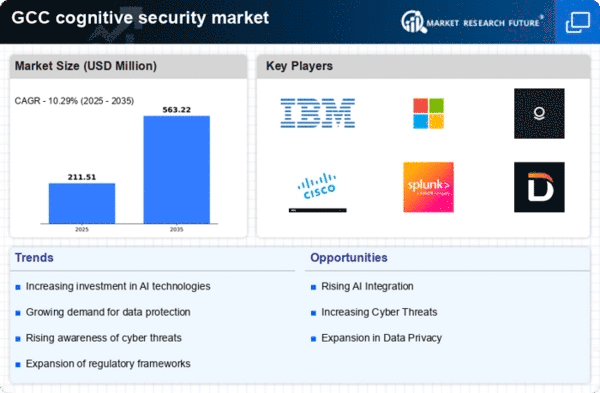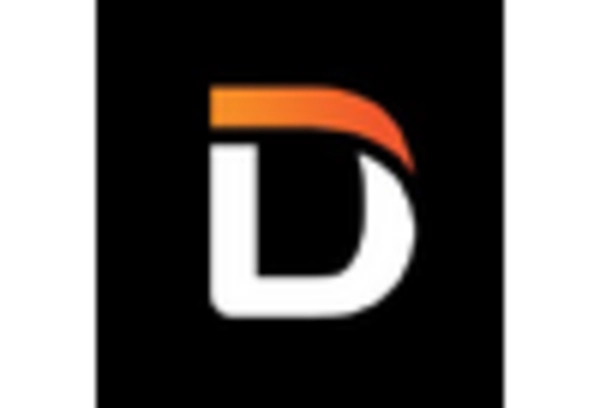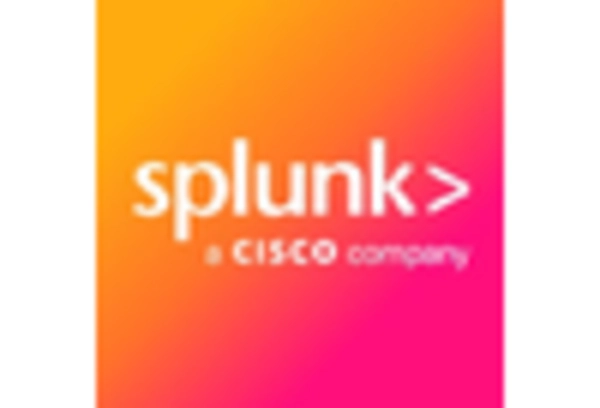Rising Cyber Threats
The cognitive security market is experiencing heightened demand due to the increasing frequency and sophistication of cyber threats in the GCC region. Organizations are facing a surge in cyberattacks, which has prompted a shift towards advanced security solutions. In 2025, it is estimated that cybercrime could cost businesses globally over $10 trillion annually, with a significant portion of this impact felt in the GCC. As a result, companies are investing in cognitive security technologies to enhance their threat detection and response capabilities. This trend indicates a growing recognition of the need for proactive security measures. This recognition is driving the cognitive security market forward.
Increased Regulatory Focus
Regulatory bodies in the GCC are placing greater emphasis on cybersecurity regulations, which is impacting the cognitive security market. New compliance requirements are emerging, compelling organizations to adopt advanced security measures to meet these standards. For instance, the introduction of data protection laws in various GCC countries is driving the demand for cognitive security solutions that ensure compliance. By 2025, it is anticipated that compliance-related investments in cybersecurity could account for up to 30% of total IT security budgets in the region. This regulatory focus is likely to stimulate growth in the cognitive security market. Businesses are seeking to align with evolving legal frameworks.
Adoption of Advanced Analytics
The cognitive security market is being propelled by the adoption of advanced analytics and machine learning technologies in the GCC region. Organizations in the GCC are increasingly leveraging these technologies to enhance their security posture and improve threat detection capabilities. By 2025, it is projected that the market for AI-driven security solutions will grow by over 40% in the region. This trend suggests that businesses are recognizing the value of cognitive security solutions that utilize advanced analytics to identify and mitigate potential threats in real-time. Consequently, this adoption is likely to drive significant growth in the cognitive security market.
Growing Awareness of Data Privacy
As data breaches become more prevalent, there is a growing awareness of data privacy issues among consumers and businesses in the GCC. This heightened awareness is driving organizations to invest in cognitive security solutions that prioritize data protection. In 2025, it is estimated that the data protection market in the GCC will reach $2 billion, reflecting the increasing importance of safeguarding sensitive information. This trend indicates that businesses are recognizing the need for comprehensive security strategies. This recognition is fostering growth in the cognitive security market as they seek to enhance their data privacy measures.
Investment in Smart Infrastructure
The GCC countries are heavily investing in smart infrastructure projects, which is significantly influencing the cognitive security market. As cities become more interconnected through IoT devices and smart technologies, the potential attack surface for cyber threats expands. In 2025, the smart city market in the GCC is projected to reach $50 billion, necessitating robust cognitive security solutions to protect critical infrastructure. This investment trend suggests that organizations are increasingly prioritizing security in their digital transformation initiatives. This prioritization is propelling the growth of the cognitive security market.
















